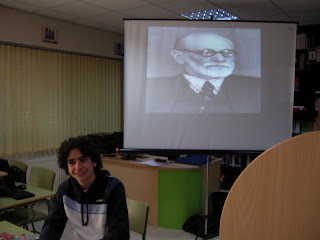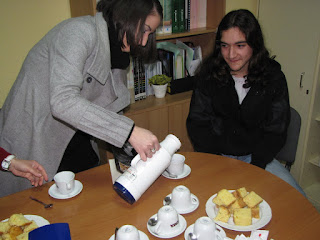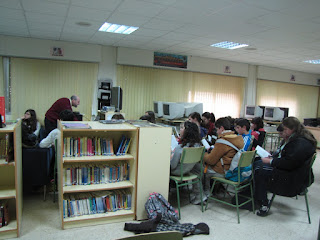HAMLET´S PLAYSCRIPT
Main characters:
CLAUDIUS ………………………………............ King of Danemark
GERTRUDE…………………….........…………... Queen of Danemark
HAMLET………………………………..........…… Prince of Danemark
HORATIO …………………………...........…….. Hamlet’s best friend
ROSENCRATZ............................................ Hamlet’s friend
OPHELIA …………………………………........... Hamlet’s beloved
POLONIUS....................................................... Ophelia’s father
LAERTES ……………………………...............……… Ophelia’s brother
GHOST ………………………………...............…….. Hamlet’s father
PEOPLE
NARRATOR
1st SCENE
NARRATOR: People of Danemark: ‘ Claudius always wanted to be a king. Hamlet is the true king after his father’s death. But Claudius didn’t want that. That’s why he married Queen Gertrude.’
HAMLET: ‘ How can my mother forget my dear father so quickly?’ He loved her so much. But on two months after his death, she’s married my uncle.
CLAUDIUS: ‘ Hamlet you are like a son to me. Why are you still unhappy about your dead father? I’m your father now.’
GERTRUDE: ‘ don’t think about your father so much. Everybody has to die. Why do you look so sad?
HAMLET: ‘ I can’t forget my father quickly.’
2ND SCENE
HORATIO: ‘ I saw a ghost on the walls of the castle last night’
HAMLET: ‘What ghost? What did it look like?
HORATIO: ‘It looked like your dead father.
HAMLET: I’ll watch with you tonight. Perhaps it will come again. I’ll talk to it.
NARRATOR: That night, Hamlet joined Horatio. It was nearly midnight. Suddenly Horatio looked up and cried out.
HORATIO: There’s the ghost!
HAMLET: Tell me who you are. What do you want?
GHOST: I’m your father’s ghost. I was murdered by Claudius, your uncle. When I was asleep in my garden he poured poison into my ears. Nobody knew how I died.
You must do something, Hamlet. You must kill Claudius for his crime. But don’t hurt your mother. But remember me.
HORATIO: Are you all right? What did the ghost say?
HAMLET: Don’t tell anyone about tonight ! Don’t tell anyone about the ghost!
3 RD SCENE
NARRATOR: After he met the ghost, Hamlet changed. He pretended to be mad. He said and do very strange things. Her mother became more and more worried about her son.
HAMLET: I’m not happy now. I can’t enjoy anything and I never laugh. Nothing in the world is interesting or beautiful, everything is ugly.
ROSENCRATZ: Some actors are coming to act in a play. You always enjoy plays.
NARRATOR: The play was about the death of an old king. Then Hamlet had got an idea.
HAMLET: I’ll ask the actors to act a story which is like the death of my father. I’ll ask Claudius to watch the play and I’ll watch his face.
NARRATOR: Ophelia’s was Hamlet’s girlfriend. Her father Polonius was a servant of the king. Her brother Laertes was in France. Hamlet acted strangely towards Ophelia and she was very hurt. She loved Hamlet very much and she couldn’t understand what was wrong. Claudius and Gertrude were at the play.
The king in the played got killed exactly the same way as Hamlet’s father was.
OPHELIA: Look! Claudius is standing up!
POLONIUS: Stop the play!
CLAUDIUS: Put the lights on! Go away everybody! Leave the room!
HAMLET: Did you see what the king did ? I’m sure he killed my father.
NARRATOR: The queen wanted to speak to Hamlet. Ophelia’s father Polonius was hiddden behind the curtains to hear Hamlet’s words to his mother.
GERTRUDE: You’ve made your father very angry.
HAMLET: My father! But Claudius is not my father!
GERTRUDE: Don’t speak to me like that! Have you forgotten who I am? What are you going to do? Are you going to kill me? Help!! Help!!
NARRATOR: Polonius started crying for help, too. Hamlet thought it was Claudius so he took his sword and killed him. When he pulled back the curtain he saw Polonius.
GERTRUDE: You’ve made a terrible thing. You’ve killed Polonius.
HAMLET: Yes, it’s almost as bad as the murder of a king! Yes, my father was a good man, how could you forget him so quickly and marry my uncle? He is a very bad man . A murderer.
GHOST: Look at your mother. She’s very frightened. Speak to her!
HAMLET: What’s the matter with you, mother?
GERTRUDE: What’s the matter with you, Hamlet? You are talking to the air. what can you see?
HAMLET: HIM! Can’t you see him?
GERTRUDE: I can’t see anything!
HAMLET: It’s the ghost of my father.
GERTRUDE: There’s no ghost! You’re mad!
HAMLET: I’m not mad. My father’s ghost has come here because of your crime!
SCENE 4TH
NARRATOR: Claudius knew immdeiately what was wrong whenhe talked to Gertrude so he decide to send Hamlet to England. He gave a letter to Hamlet’s friends for the King of England. He asked the king to kill Hamlet.
Hamlet discovered Claudius plans and returned sane and safe to Danemark.
Then Hamlet met his friend Horatio and found out that Ophelia his girlfriend was dead. When Hamlet killed her father she went mad.
Laertes, Ophelia’s brother has come back to France and wanted to take revenge on his father’s and sister’s dead.
Claudius told Laertes his plan to kill Hamlet.
CLAUDIUS: I want to be sure of his death. During the fight I’ll offer him wine with poison in it.
NARRATOR: Everyone came to the fight between Laertes and Hamlet.
HAMLET: Please, forgive me. I’ve acted badly. I’m very sorry. I didn’t want to hurt you.
LAERTES: I accept it but we must fight.
NARRATOR: Claudius offered Hamlet the poisoned wine but Hamlet wasn’t thirsty. Before he could stop it the queen , Hamlet’s mother, drank the wine. Laertes hurt Hamlet with the poisonous sword and then Hamlet took by mistake Laertes sword and hurt him.
GERTRUDE: The drink is poisoned!!
LAERTES: My sword is poisoned both are going to die.
HAMLET: Poisoned sword? Here’s the best place for it!
NARRATOR: He pushed the sword into the king’s heart. Laertes fell dead and the king, too. Hamlet turned to Horatio.
HAMLET: I’m dying, but you must tell my story to the world.
































































